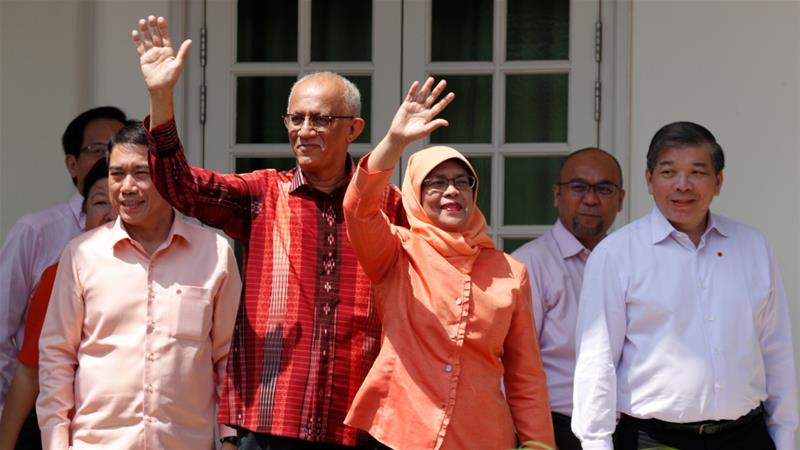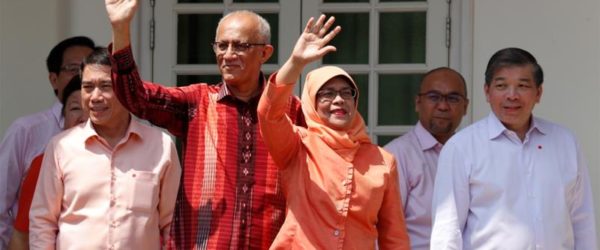*A note on Malay naming conventions: President Halimah is being called “President Yacob” is Anglophone media outlets. From a Malay perspective this is is odd because “Yacob” is her father’s name and not a family name. Therefore, it is more appropriate to use Madam Halimah or President Halimah. Click here for more information on Malay naming conventions.

President Halimah – Via Al Jazeera.
Halimah Yacob, former first woman Speaker of Parliament in Singapore, was elected president in a walkover presidential election earlier in September. This year, the presidential election was reserved for the minority Malay community, in a new and sudden decision by the ruling political party. Although the president is supposed to be elected by popular vote since 1991, the strict criteria have led to walkovers for three out of a total of five presidential elections.
The new rules created for this election hinted at making the criteria more stringent for the other two candidates, who are independent businessmen and not affiliated with any political party. In the 2011 presidential election, one criterion for private sector candidates was that “they have to be the chairman or chief executive officer of a company with a paid-up capital of at least S$100 million.” In this year’s election, this criterion was increased to S$500 million.
In comparison, for trained lawyer 63-year-old President Halimah, the required qualifications as a former public servant conveniently included at least three years as Speaker of Parliament – a position she has held since 2013. She has also been a member of the ruling political party since 2001, the People’s Action Party (PAP), which has been in power since independence. In 2011, she was appointed Minister of State for the Ministry of Community Development, Youth and Sports (now the Ministry of Social and Family Development). Just a year into that role, she was nominated by the current Prime Minister for her new position as Speaker of Parliament. After three years in this role she resigned a month before running for president.
Being the first female candidate to run for president, President Halimah’s gender and ethnicity were often highlighted by state media outlets. Since the election was reserved for Malays, there was even a government committee created to determine which of the three candidates Malay were “enough”. This criteria was impossible to determine because the category of “Malay” as a “race” or ethnic group is contested, fluid and dynamic.
Norshahril Saat, a fellow at the Yusof Ishak Institute within the Institute of Southeast Asian Studies, points out that most Singaporeans have mixed ancestry. He explains, “If you follow ancestry strictly, then no candidate would qualify as a Malay. Inter-ethnic marriages have made this perspective irrelevant, and it is difficult to find a pure Malay.”
The Parliamentary Elections Act define a person belonging to the Malay community as “any person, whether of the Malay race or otherwise, who considers himself to be a member of the Malay community and who is generally accepted as a member of the Malay community by that community.”
In 1987 and 1988, a government committee held hearings with representatives, since some Malay leaders felt strongly about including Islam in the definition of a “Malay.” The committee concluded on the importance of self-definition: “A person belonging to the Malay community must think of himself as Malay, and must be acceptable to the Malay community (…) Therefore the legislation should not lay down prescriptive criteria as to who does or does not belong to the Malay community, but should define a mechanism to let the community decide for itself.”
Being a visible Muslim woman who wears hijab, President Halimah’s religion was also pointed out by two Singaporeans as a positive example of how a secular country that values “meritocracy” is able to accept a leader who is a woman, from a minority community and is also a visible Muslim.
The election of President Halimah was brought up by foreign experts several times at the 68th Session on the Elimination of Discrimination Against Women in Geneva a few weeks ago, during the Consideration of Singapore Meeting. According to them, if a Malay Muslim woman can be president, there should be other affirmative action or special measures in place to ensure that there is a gender balance not just in Parliament, but also in all public and private sectors.
The outcome of the election, which saw Singapore’s first female, Malay and Muslim president, [EC1] was also mentioned by Musawah, in their thematic report on Muslim family law and Muslim women’s rights in Singapore for this year’s Convention on the Elimination of All Forms of Discrimination against Women (CEDAW) session. The president’s gender is highlighted, and so the scheme is touted as a positive one. Their report states: “The scheme has allowed for the appointment of Halimah Yacob, the first female Parliamentary Speaker, to be the first woman President of Singapore.”
In conclusion, the new scheme to elect presidents in Singapore, along with newly established selection criteria aimed to select President Halimah, has created a fertile space for alternative theories about her new role. It has further invited racists, Islamophobes and critics from within the Malay community to question the process – making it difficult to tease out the different standpoints.

